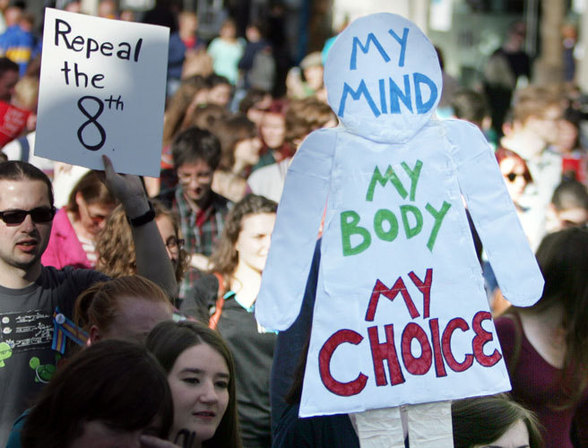Headlines these past few weeks have been dominated by stories of Brazilian arrests, Olympic triumphs, and complicated tax affairs of multinationals, to name but a few. All of this has overshadowed a significant event in the pipeline – October’s Citizens’ Assembly. The assembly, which will predominantly focus on the issue of the eighth amendment, looks likely to advise the government to hold a referendum on the place of the amendment in our constitution some time in the near future.
Those, like me, who support liberalising our abortion laws would welcome such a ruling. In fact, considering anyone under the age of 50 has never been given the opportunity to vote on the eighth amendment’s existence in Bunreacht na hEireann, even those against repealing it should recognise the democratic necessity of putting the question to the Irish people. The issue that should concern everyone, however, is the aggressive and divisive tones coming from both sides of the debate. The unfortunate reality is that as a referendum approaches, this level of hostility is only likely to intensify.
The issue with the debate at present is how frequently and rapidly it descends into name calling and depicting the opposing side using extreme language and stereotypes
Abortion remains a thorny issue within Irish society. When the Sydney Rose, Brianna Parkins, took to the stage in Tralee a few weeks ago to declare her support for repealing the eighth, her remarks were met with both gratitude and contempt. The Rose of Tralee, a bulwark of a more conservative Ireland, was now at the centre of a debate surrounding one of the most controversial political issues in recent times.
Many viewed Parkins’s comments in a favourable light. After all, the Rose of Tralee is a contest for women, and abortion is an issue that affects women. It makes sense that this issue would be raised in such a way. Others – including chair of the competition’s judging panel, Mary Kennedy – disagreed, however, stating that the Rose of Tralee was “not the place” to discuss abortion.
The varied response to the Sydney Rose’s comments acts as a good reminder of just how contentious abortion remains in the current climate.
The issue with the debate at present is how frequently and rapidly it descends into name calling and depicting the opposing side using extreme language and stereotypes. So-called “pro-life” campaigners often accuse so-called “pro-choice” ones of supporting infanticide, while the “pro-choice” side regularly implies that the “pro-life” side are automatically a group of religious fanatics and misogynists. These ridiculous comments and lazy representations are not only inaccurate, but serve to cast divisions within Irish society.
They also hamper both campaigns. It must be remembered that, for many people, abortion is not a black-and-white issue. If and when a referendum is called, both sides will have to convince the electorate as to why they should vote a particular way. By engaging in this reactive behaviour rather than discussing the intricate and important issues that arise from the debate, both campaigns will find it extremely difficult to persuade undecided middle ground voters. The success of the yes side in the marriage equality referendum is worth pointing out here – the success of the yes side has been largely attributed to how willing people were to sit down and have measured conversations with those who held opposing views.
The overwhelming majority of those opposed to abortion will have been equally disgusted with the Times’s revelations as those in favour of it
Poignant examples such as the recent women’s clinic scandal, where the Times revealed that a Dublin pregnancy counselling clinic was giving out false information, do not help in trying to detoxify the debate on abortion. A clinic that perpetuates lies such as claiming that women who get abortions are at a greater risk of getting breast cancer and more likely to abuse future children has, appropriately, drawn widespread fury. Places such as these should unquestionably be shut down, and it is the government’s role to regulate such practices.
But it is important to recognise that this clinic is not representative of the entire anti-abortion movement. In fact, the overwhelming majority of those opposed to abortion will have been equally disgusted with the Times’s revelations as those in favour of it.
It is my hope that Irish women will soon have access to safe and legal abortions in their own country. That said, it is also my hope that both sides of the debate will start to engage in a civilised discussion where they at least learn to respect that others might hold an opposing view rather than continue to exchange insults and falsehoods. Until then, I dread the lead up to what is set to be one of the most divisive referendums in the State’s history.







